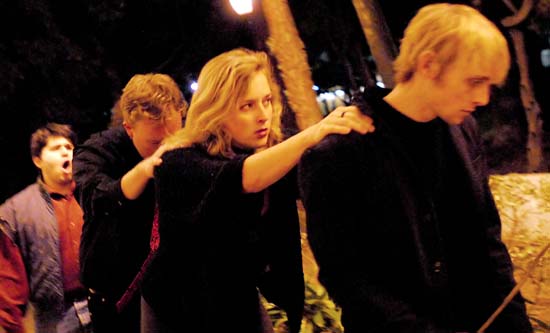Sam Gibbs spent the summer waiting.
He had been waiting for a teacher ““ or anybody really ““ to come along and tell him what to do. He had been looking for a creative outlet all summer long, but his search progressed at a pace little faster than a lackadaisical crawl. As August came to a close, he was reading through William Shakespeare’s collected works when a lightning bolt of inspiration struck.
He had rediscovered an old favorite, “Titus Andronicus,” and resolved to put it on at any cost. Now, only a week before finals, Gibbs, a fourth-year theater student and the play’s director, is putting on the show’s finishing touches before its midnight debut on Thursday, Dec. 3.
Gibbs sets the tragedy ““ a family-level power struggle between Romans and Goths that translates to the entire Roman empire ““ in a post-apocalyptic Washington DC.
“It is set in a society where the value system is really starting to crumble. This collapsing empire turns different people ““ from the politician down to peasants on the street ““ into an animal of some kind. I was thinking that it would be great to parallel the Roman Empire with the imaginary collapse of the United States,” Gibbs said.
Although Gibbs constructed the show’s creative scaffolding, his directorial style required creative collaboration of his cast to fill in the show’s details. Most actors provided their own costumes and Gibbs encouraged them to experiment with their characters.
“There are absolutely no rules,” said Megan Pfefferkorn, a third-year theater student. “You can do anything and try anything and constantly bring in any idea and try it out. He’s always game for imagining the play. That’s kind of the rule, just play. A lot of the scenes have come from improvisations. Then he takes that and tweaks the pictures.”
Gibbs and Ryan Castalia, a third-year theater student and producer of “Titus Andronicus,” learned that improvisation and experimentation were necessary in staging a completely student-run production.
“We were trying to work more closely with the theater department, but it was difficult for us to negotiate (and) to find space for non-department associated work. All the space is reserved for the plays that the department puts on and rehearsals for class,” Castalia said. “We ended up taking it into our own hands and doing it ourselves. In a way, it’s been even better because it’s forced us to take things and create something that we’re pretty proud of on our own without anybody’s help.”
Michael Hackett, a UCLA theater professor who consulted with Gibbs about “Titus Andronicus,” said he lamented the theater school’s lack of available space for non-departmental productions.
Without a rehearsal space, let alone a performance venue, the cast and crew moved outdoors to work on their play. They practiced in the Murphy Sculpture Garden until discovering their current location: a neighboring alcove nestled on the north end of the Public Affairs Building. Those involved with the play viewed the venue’s discovery as not only fortuitous, but also ideal.
“It had everything we wanted. The play is about the differences between what goes down when you’re in a very controlled environment like the Romans are at the beginning in the palace and what happens when you go out into nature and the animal side of these characters comes out. This place that we found has all of that in one. It was pretty much our dream come true,” said Chloe Sanders, a fourth-year theater student who plays Tamora, Queen of the Goths.
Janet Leon, a fourth-year theater student and the play’s stage manager, said she believes that the independence granted to Gibbs and the cast led to more collaboration and personal accountability than in most departmental plays.
“We’re not babied by the theater department whatsoever, we’re not doing this for credit, we don’t have TAs telling us what to do, we don’t have MFAs telling us what to do, or directors, or teachers. We’ve come together and we’re all there to support each other. If one person fails, the whole team fails,” Leon said.
As a band apart from the UCLA theater department, the “Titus Andronicus” playmakers had to learn and work together to succeed. Hackett said he values Gibbs’ explorative bravado as well as his cast’s collaborative enthusiasm.
“Sam and Ryan and many of the people in this show are the people that excite us. The kinds of students that we want at UCLA are people that come up with their own ideas, their own projects and have their own passions,” he said.
Gibbs never had taken on a project of this scale before, but learned how proactive positivity ““ the combination of believing in and working for a lofty goal ““ produces results.
“You can sit around and fret about something, but if you optimistically put time into it and get a lot of other people interested in it, it can really happen. It’s a wish fulfillment type of thing,” Gibbs said.
